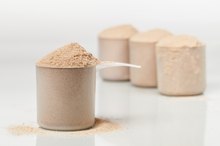What does fact checked mean?
At Healthfully, we strive to deliver objective content that is accurate and up-to-date. Our team periodically reviews articles in order to ensure content quality. The sources cited below consist of evidence from peer-reviewed journals, prominent medical organizations, academic associations, and government data.
- Centers for Disease Control and Prevention: Protein
- MedlinePlus: Protein in Diet
- International Journal of Sport Nutrition and Exercise Metabolism: Nutritional Strategies to Promote Postexercise Recovery
- International Journal of Sport Nutrition and Exercise Metabolism: Nutritional Strategies to Promote Postexercise Recovery
The information contained on this site is for informational purposes only, and should not be used as a substitute for the advice of a professional health care provider. Please check with the appropriate physician regarding health questions and concerns. Although we strive to deliver accurate and up-to-date information, no guarantee to that effect is made.
Mixing Whey Protein & Egg White Protein Together
Powdered supplemental protein is available created from several different sources -- whey and egg whites are two common ones. Each has a long shelf life; neither requires refrigeration before use and each blends easily with water or other fluids. While either protein source can be beneficial if it is used properly, you may find that combining the two provides additional benefits that neither could offer alone.
Protein Sources
Whey protein and egg protein are popular sports nutrition supplements, thanks to their versatility 3. You can add the high-protein, low-fat powders to smoothies and shakes, to baked goods like muffins or pancakes, or simply to beverages like water or milk. These supplements also tend to be inexpensive when compared to other protein sources on a price-per-gram basis; whole foods such as fish, beef and even chicken can often end up costing much more per gram than whey and egg white protein powders 3.
Differences
Casein Protein for Weight Loss
Learn More
Despite the similarities, whey protein and egg white protein do have some differences, such as absorption rate. Whey protein is considered a premier choice for post-workout use because it is absorbed rapidly by your body, which may facilitate enhanced recovery. However, protein that is more slowly absorbed also has benefits: Egg white protein and other slow proteins can provide a sustained release of amino acids to ensure that your muscles have adequate nutrition throughout the day. Muscle recovery takes much longer than just the first few minutes after a workout, so consuming slower protein sources as well as easily absorbed protein sources can be helpful for building muscle and for helping curb your appetite if you are attempting to lose weight.
- Despite the similarities, whey protein and egg white protein do have some differences, such as absorption rate.
- Whey protein is considered a premier choice for post-workout use because it is absorbed rapidly by your body, which may facilitate enhanced recovery.
Intake Levels
Most men need about 56 grams of protein per day, while most women need about 46 grams per day, according to the Centers for Disease Control and Prevention. It is a common misconception that eating more protein than you need can be harmful to your kidneys -- that is usually only the case if you have preexisting kidney disease. However, consuming more than your daily requirement of protein will not provide any particular extra benefit to your body in terms of muscle recovery, and could contribute to excess calorie intake.
Other Considerations
How Much Protein Should a Female Bodybuilder Consume?
Learn More
Because whey and egg white protein both come in powdered form, they mix together quite easily. In addition, since both supplements tend to be flavored, you should be able to find a variety with a taste you like. Although mixing the two supplements together in one storage tub can be convenient, keeping them separate allows you to control the ratio of slow to fast protein, which can be beneficial.
- Because whey and egg white protein both come in powdered form, they mix together quite easily.
- Although mixing the two supplements together in one storage tub can be convenient, keeping them separate allows you to control the ratio of slow to fast protein, which can be beneficial.
Related Articles
References
- MedlinePlus: Protein in Diet
- International Journal of Sport Nutrition and Exercise Metabolism: Nutritional Strategies to Promote Postexercise Recovery
- Muscle and Strength: Protein Supplements Guide
- University of Michigan Medical School: Protein Supplements
- Gilbert, J.-A., Bendsen, N. T., Tremblay, A., & Astrup, A. (2011). Effect of proteins from different sources on body composition. Nutrition, Metabolism and Cardiovascular Diseases, 21, B16–B31. DOI: 10.1016/j.numecd.2010.12.008.
- Hulmi, J. J., Lockwood, C. M., & Stout, J. R. (2010). Effect of protein/essential amino acids and resistance training on skeletal muscle hypertrophy: A case for whey protein. Nutrition & Metabolism, 7(1), 51. DOI: 10.1186/1743-7075-7-51.
- Ridge, A., Devine, A., Lyons-wall, P., Conlon, J., & Lo, J. (2018). The impact of whey protein supplementation in older adults on nutrient intakes and satiety over an 11-week exercise intervention. Food Quality and Preference, 68, 72–79. DOI: 10.1016/j.foodqual.2018.01.013.
- Tahavorgar, A., Vafa, M., Shidfar, F., Gohari, M., & Heydari, I. (2014). Whey protein preloads are more beneficial than soy protein preloads in regulating appetite, calorie intake, anthropometry, and body composition of overweight and obese men. Nutrition Research, 34(10), 856–861. DOI: 10.1016/j.nutres.2014.08.015.
- Thomas, D. T., Erdman, K. A., & Burke, L. M. (2016). Position of the Academy of Nutrition and Dietetics, Dietitians of Canada, and the American College of Sports Medicine: Nutrition and Athletic Performance. Journal of the Academy of Nutrition and Dietetics, 116(3), 501–528. DOI: 10.1016/j.jand.2015.12.006.
- Zhu, K., Kerr, D. A., Meng, X., Devine, A., Solah, V., Binns, C. W., & Prince, R. L. (2015). Two-Year Whey Protein Supplementation Did Not Enhance Muscle Mass and Physical Function in Well-Nourished Healthy Older Postmenopausal Women. The Journal of Nutrition, 145(11), 2520–2526. DOI: 10.3945/jn.115.218297.
Writer Bio
Joseph McAllister has worked as a writer since 2003. He has more than seven years of experience in training and coaching martial arts. McAllister writes for various websites on a variety of topics including martial arts, competition and fitness. He graduated from Liberty University on a full ride National Merit Scholarship with a Bachelor of Science in print journalism.









